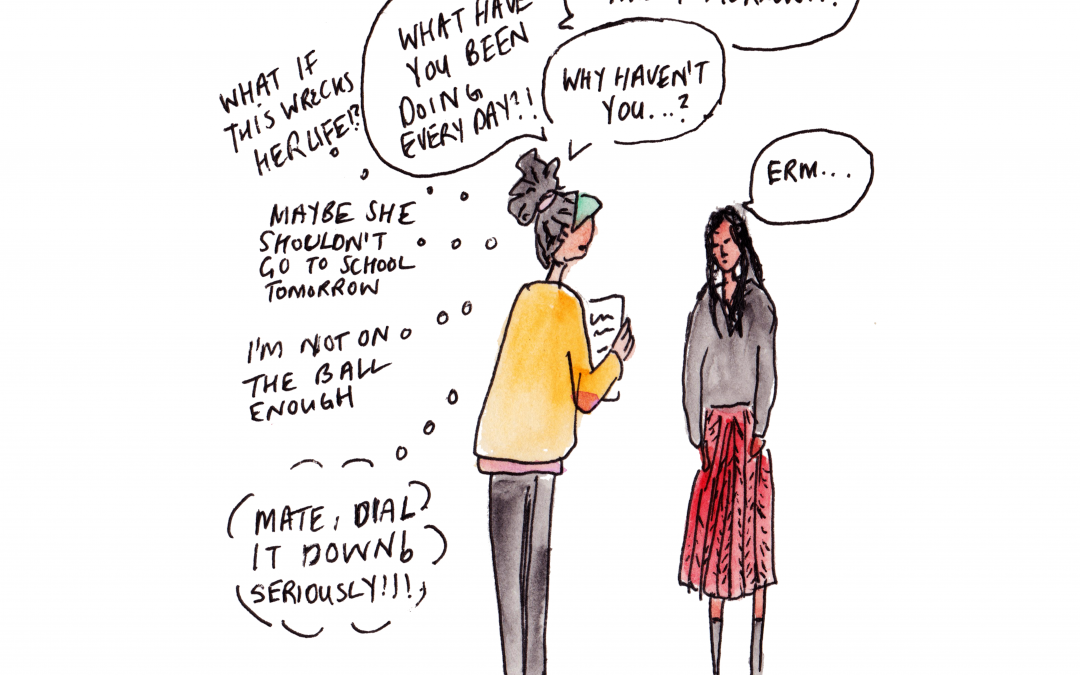This week’s episode of The Baggage Reclaim Sessions explores freaking out over decisions. So many of us learned from the adults around us while growing up to regard things we do in childhood as what determines our life and to see decisions turning out differently to what we expected or ‘planned’ as “wrong” and “failure”.
My eldest daughter’s in her second year of secondary school and not only is she doing exams, but she’s also got to choose her subjects that she’ll focus on for the next three years for her GCSEs. It’s triggered anxiety for her about this seeming “life decision” that she’s expected to make at age twelve. And.. my anxiety reared its ugly head in the form of a freakout over her exams.
Subscribe on Apple Podcasts | Spotify | Android
Some nuggets from the episode
- When I acknowledged my freakout while in the midst of it, I became more self-aware. Even though I still wasn’t having my finest hour, noticing was like pushing an observation button that also caused me to slow down a little at the same time.
- There’s a part of us that still thinks that we’re going to get into “trouble” if we make a wrong move, as if our life is not our own, but also as if we’re wrecking our life with our decisions and that we should know everything.
- Sure, it’s not the ideal situation to be underprepared for something, but isn’t it something to learn from, especially if we thought that we were more prepared than we actually are?
- We have to be careful of pigeonholing ourselves and others. While it’s useful, for instance, to get information about where we’re at and where a teacher thinks we could end up, there’s a danger of underestimating ourselves.
Where you’re at now isn’t a prediction of where you will end up. Things change. You change.
- When we’re honest with ourselves about how we relate to decisions, to our past, present and future self, we have an opportunity to be more self-compassionate.
- Society has done a pretty good job of conditioning us into having a painful relationship with decision-making. We’ve learned that if we don’t like how a decision turns out or we change our mind, that this is a sign of failure and being wrong. We think we’ve messed up. Actually, if we don’t like how a decision turns out or we change our mind, or, in fact, we decide to do something else based on where we are at that point, that’s called information. It’s experience. It’s closing one chapter and moving on to the next.
It’s okay to freak out. But notice that you are. And figure out what you’re trying to control or which version of your younger self is afraid.
- Rather than trying to work out if we will like a decision forever, how about we work our way up from next week, to next month, and so on, to get a gauge of what we’re truly thinking and feeling? Can we envision ourselves? Do we need more information? Are we afraid? What do we learn picturing ourselves?
Links mentioned
- I ‘Failed’, But I’m OK (ep. 126)
- Melissa Hunter’s tweet about the need to profile middle-aged people
- What I learned from training for and running the London Marathon (ep. 143)
- What’s the baggage behind it? (ep. 2)
Subscribe and/or leave a review on Apple Podcasts (how-to guide here)–it really helps in growing the show! If you’re new to podcasts, find out more about what they are and how to subscribe with this handy guide.

 Add to favorites
Add to favorites 

This was a brilliant episode. I thoroughly enjoyed it. I can relate to recognizing that the awareness button has been pressed but need to practice the slowing down bit.
Thanks so much, Anna!